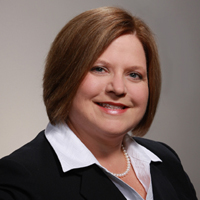Conrad Plans To Help NASBA, Boards Forge Even Closer Ties
 When she joined NASBA on Oct. 31, Colleen Conrad, CPA, didn't have much time to unpack.
When she joined NASBA on Oct. 31, Colleen Conrad, CPA, didn't have much time to unpack.
Within her first month, the new Chief Operating Officer attended NASBA's Annual Meeting in Nashville, and was plunged into a flurry of activity both within and outside the NASBA offices. But, that’s nothing new for Conrad, who prior to joining NASBA was a partner in RubinBrown LLPs Real Estate Services Group and its Assurance Services and Consulting departments, providing real estate and tax services to a national roster of clients.
She also spent 10 years on the Missouri Board of Accountancy, two of them as chair. During this time, Conrad was also actively engaged as a volunteer with NASBA, serving as a member of multiple committees including the Strategic Initiatives Committee, Bylaws Committee, Regulatory Response Committee and the Education Committee where she was named to the 150-Hour Task Force.
So, as someone who's used to a full schedule, Conrad says she's settling in just fine.
"It's fun, frankly," Conrad said. "Working with NASBA as a volunteer, I had one perspective. Now I can bring that to the other side of the table as NASBA continues to work with the state boards. I can look at everything from two perspectives, and be more into the trees than at the forest level. I want to get into the details of our work, and look not only at getting things done, but at how we get them done."
During her more than 25 years of practice, Conrad specialized in the real estate industry, so she's used to dealing with an entrepreneurial mindset devoted to getting deals done. She was also the chair in charge of risk management at her firm, so considering all facets before making important decisions comes naturally to her. Both of those skill sets will come in handy at NASBA, she said.
"Being able to put a deal together, and then also be able to wind them down on the back end is a good way to see how an entire process should work," she said. "I also worked with many different clients, which will help me understand the varying needs and goals of our various boards. You see what works, what doesn’t work, and let all that experience shape the evolution of your processes."
Overseeing NASBA's ongoing evolution will be a key role for Conrad, and she says she hopes to build on the change she’s seen within the organization in the last few years.
"NASBA has ramped up its relevance in the accounting profession, and it has done so significantly," she said. "We are a player at the table. I think David Costello and Ken Bishop have been instrumental in that. They have brought NASBA from an organization that people weren’t familiar with, and didn't know what it stood for and did, to one that plays a significant role in the CPA exam and continues to aggressively represent the interests of the state boards."
NASBA's position as an association, rather than a regulatory agency, allows it more flexibility to be entrepreneurial in this regard. But in order for it to succeed, it will still need to build consensus within its membership on specific issues, and ensure that all differing points of view are heard in those conversations, she added.
"Listening skills are important; truly listening to the boards, and knowing that they have points of view for a reason, will be key to our understanding what they need, and working with them to accomplish that," Conrad said. "That’s the beauty of NASBA. The boards have ties to state governments and so they don't always get to do what they want to do. We have to understand what they have to deal with in their state, the red tape involved, and then work on the issue from a larger perspective, so that we can advocate for those wants, and try to help bring about change."
As NASBA moves into 2012, Conrad says that strategic planning will be vital to ensuring effectiveness, both for the organization itself and for its continuing advocacy on behalf of the member boards.
"Our focus is getting back to the basics with the state boards. To accomplish this goal, we will be hitting the pavement – meeting with boards, hearing what they want, assessing their needs and making sure we’re doing everything we can to support them," she said. "Whether it's a new service or providing assistance on the legislative front, we're making sure that everything we have is running as efficiently as possible. We're going to be making sure we maintain our relevance to the boards, and also at the national and global tables we now sit at as well."
Conrad accedes to the Executive Vice President and COO role on January 1, 2012.
